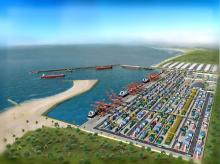Germany-based HeidelbergCement, which has met significant debt reduction and other financial targets it set in 2009, said on Wednesday it would focus on raising its dividend, expanding the company, cutting debt further and possibly buying back shares.
The company said it expected cumulative cash flow of about €8.8 billion between 2015 and 2019, of which around €3 billion at least will remain after planned investment for growth, debt reduction and dividend increases.
“Then the question is what are we going to do with that? And here we leave it open on whether we go for a further increase in dividends or even a share buyback, and we will look at whether we have attractive investment opportunities," chief executive Bernd Scheifele told investors at a presentation in London, England.
HeidelbergCement shares rallied on the company's comments to close 4.8 percent higher, the top gainers on the German blue-chip DAX index.
The cement sector giant’s priority markets for investment remain the United States, Africa and Asia, more specifically India, Australia and Indonesia, Scheifele said.
Producers of cement, concrete and building products, HeidelbergCement claims to be the world's biggest producer of sand, gravel and crushed-rock aggregates. Scheifele said the company had a better integration of its product range of cement, aggregates, ready-mixed concrete and asphalt than the future Holcim-Lafarge, considering its much smaller size.
"If you are vertically integrated in ready mix and aggregates ... then you can use unsellable products ... or you can do blending, and then you turn waste into a sellable product," he said.
Lafarge and Holcim plan to create the world's biggest cement maker with €40 billion in annual sales, compared with HeidelbergCement's €12.6 billion last year.
Presenting new mid-term targets, HeidelbergCement said it aimed to almost double its operating earnings before interest, tax, depreciation and amortisation (EBITDA) to more than €4 billion by 2019 and raise sales by at least 35% to over €17 billion.
It also said it planned to lift its dividend payout ratio to 40-45% by the end of 2019, compared with a previous medium-term target of 30-35%.
Its net debt to operating EBITDA ratio should stay in a range of 1.5 to 2.5, and could drop to 2.0 or 2.1 this year from 2.5 in 2014, the company said.
HeidelbergCement, which has been stepping up business in countries including Indonesia, Kazakhstan, Tanzania, Togo and Burkina Faso, said it was committed to "disciplined growth in attractive markets".
Indonesia is expected to see a strong pickup in growth in the second half as big infrastructure projects get under way, Scheifele said. "We think we can increase profitability in absolute terms in Indonesia."
Scheifele also said he believed HeidelbergCement's clear management structures, policy of hiring local managers and keeping bosses in one place for long periods gave it an edge over its French and Swiss rivals.
"Management is responsible in a very basic industry for the employees to know in the morning what they are supposed to do, who is in charge of hiring and firing, and then they go home happy and play sports or watch TV or whatever," he said. "This is not a complicated business with a lot of academics."





